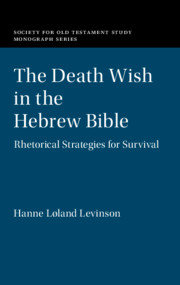Book contents
- The Death Wish in the Hebrew Bible
- Society for Old Testament Study Monographs
- The Death Wish in the Hebrew Bible
- Copyright page
- Dedication
- Contents
- Preface
- Acknowledgments
- Abbreviations
- 1 Introduction
- 2 Death Wish as Negotiation Strategy
- 3 Death Wish in Despair and Anger
- 4 Wishing Away One’s Birth
- 5 Death Wishes as Wishful Thinking
- 6 Wishing for Death or Fighting for Life?
- Bibliography
- Author Index
- Index of Scripture and Other Sources
- Index of Hebrew Words and Phrases
- Subject Index
3 - Death Wish in Despair and Anger
Published online by Cambridge University Press: 10 September 2021
- The Death Wish in the Hebrew Bible
- Society for Old Testament Study Monographs
- The Death Wish in the Hebrew Bible
- Copyright page
- Dedication
- Contents
- Preface
- Acknowledgments
- Abbreviations
- 1 Introduction
- 2 Death Wish as Negotiation Strategy
- 3 Death Wish in Despair and Anger
- 4 Wishing Away One’s Birth
- 5 Death Wishes as Wishful Thinking
- 6 Wishing for Death or Fighting for Life?
- Bibliography
- Author Index
- Index of Scripture and Other Sources
- Index of Hebrew Words and Phrases
- Subject Index
Summary
In two powerful narratives in the Hebrew Bible, the characters Elijah and Jonah address God and ask God to take their lives (1 Kgs 19; Jonah 4). Elijah and Jonah are driven by despair and anger; they are prophets unwilling to prophesy, they are alone, and they ask God to end it all. Elijah and Jonah have much in common with the characters discussed previously, but as I hope to show in this chapter, they also differ in significant ways. Elijah and Jonah are not negotiating. They do not threaten with death to achieve certain goals in life, as Moses and Rachel did. Their death wishes are expressions of a genuine desire to die. Elijah and Jonah see their own deaths as the best solution to their problems; they ask God for death, but God does not take their lives. Death is not the outcome of their stories.
- Type
- Chapter
- Information
- The Death Wish in the Hebrew BibleRhetorical Strategies for Survival, pp. 57 - 88Publisher: Cambridge University PressPrint publication year: 2021

